"Cherishing Little Steps - A Haven for Baby and Family Journeys"
How to Build a Skincare Routine
If you've ever found yourself overwhelmed by the vast array of skincare products, wondering where to start, building a routine may seem daunting at first. However, fear not, as understanding the basics of skincare can simplify the process and lead to healthier, happier skin. By focusing on key steps tailored to your skin's needs, you can create a personalized routine that not only addresses current concerns but also promotes long-term skin health. So, what are these essential steps, and how can you incorporate them into your daily regimen? Let's unravel the secrets of crafting a skincare routine that works for you.
Key Takeaways
- Determine your skin type and concerns.
- Choose products tailored to address specific skin issues.
- Develop a routine with cleanser, moisturizer, and sunscreen.
- Incorporate exfoliation and targeted treatments like masks.
- Adjust your routine based on skin reactions for optimal results.
Determine Your Skin Type
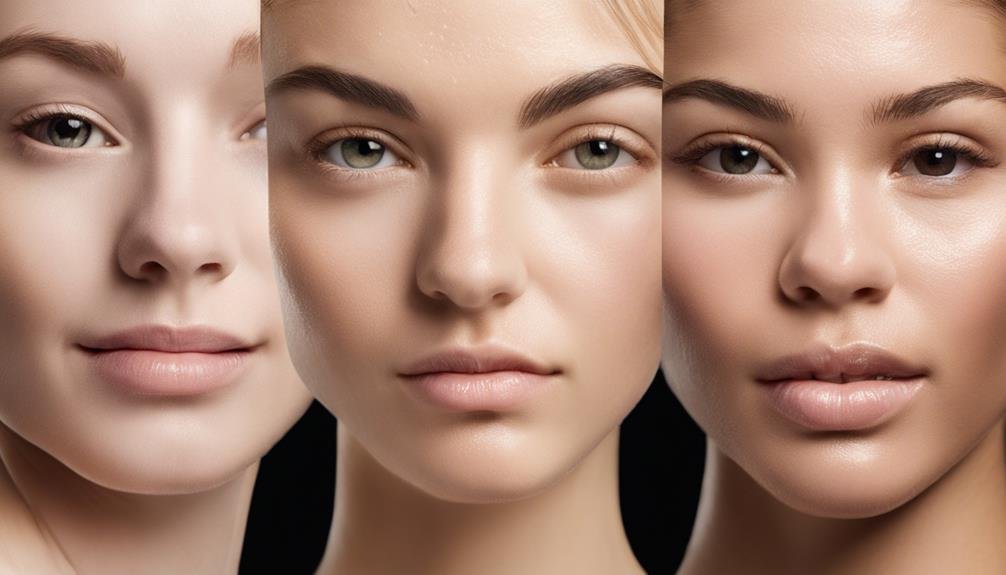
Determining your skin type is the crucial first step in creating an effective skincare routine. Understanding whether you have oily, dry, combination, sensitive, or normal skin will help you select the right products and treatments that cater to your specific needs. To determine your skin type, you can conduct a simple test at home.
In the morning, wash your face with a gentle cleanser and refrain from applying any skincare products. After an hour, observe how your skin feels. If it appears shiny and feels greasy, you likely have oily skin. Dry skin may feel tight, rough, or flaky. Combination skin often shows oiliness in the T-zone and dryness elsewhere. Sensitive skin is prone to redness, irritation, or itchiness. Normal skin feels balanced and clear without any extreme dryness or oiliness.
Once you identify your skin type, you can tailor your skincare routine to address its specific characteristics, ensuring that you provide the best care for your skin.
Identify Your Skin Concerns
To build an effective skincare routine tailored to your skin's needs, it's important to identify your specific skin concerns. Understanding what your skin needs can help you select the right products and treatments to address those concerns. Here is a table to help you identify some common skin concerns:
| Skin Concerns | Description | Common Causes |
|---|---|---|
| Acne | Breakouts and blemishes on the skin | Hormonal changes, bacteria |
| Dryness | Tightness, flakiness, or rough patches | Weather, harsh products |
| Hyperpigmentation | Dark spots or uneven skin tone | Sun exposure, inflammation |
| Sensitivity | Easily irritated or reactive skin | Allergens, harsh ingredients |
| Aging | Fine lines, wrinkles, loss of firmness | Sun exposure, genetics |
Identifying your skin concerns is the first step towards achieving healthy and radiant skin. Once you know what you're dealing with, you can tailor your skincare routine to address these specific issues effectively.
Choose the Right Cleanser
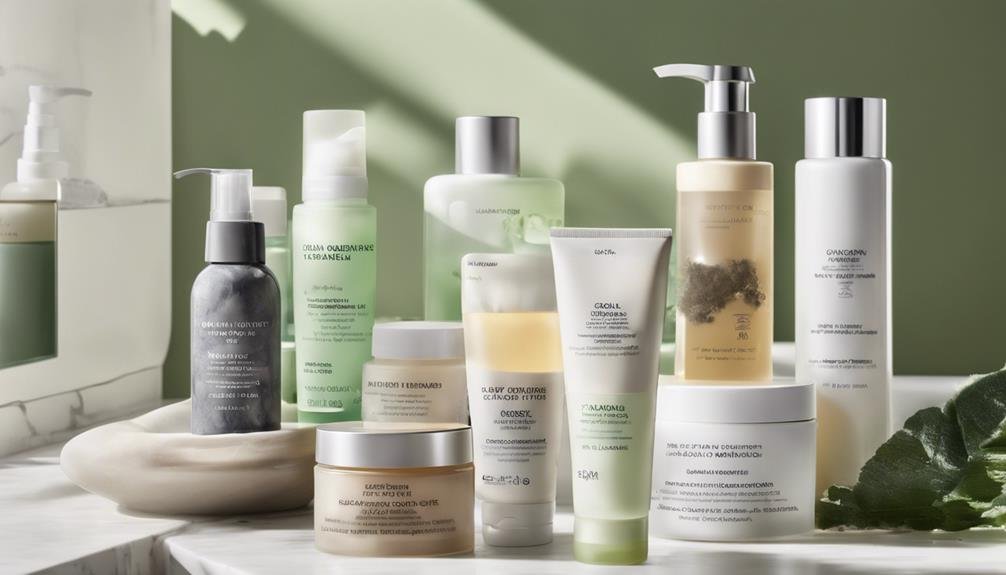
Selecting the right cleanser is a crucial step in establishing an effective skincare routine. The key is to choose a cleanser that suits your skin type and addresses your specific concerns.
For oily or acne-prone skin, opt for a foaming or gel-based cleanser with ingredients like salicylic acid to help combat excess oil and breakouts.
Dry or sensitive skin benefits from a hydrating, non-foaming cleanser that's gentle and free of harsh chemicals.
Combination skin may require a balancing cleanser that can address both oily and dry areas without causing imbalance.
When selecting a cleanser, look for labels that indicate it's pH-balanced and free from sulfates, alcohol, and artificial fragrances that can strip the skin of its natural oils and disrupt its pH levels. Remember to cleanse your face twice a day, in the morning and evening, to remove dirt, oil, and makeup residue effectively.
Incorporate Exfoliation Into Your Routine
When looking to enhance your skincare routine, incorporating exfoliation is a vital step in maintaining healthy and glowing skin. Exfoliation helps remove dead skin cells, unclogs pores, and promotes cell turnover, resulting in smoother, more radiant skin.
There are two main types of exfoliants: physical exfoliants, like scrubs or brushes, and chemical exfoliants, such as alpha hydroxy acids (AHAs) or beta hydroxy acids (BHAs).
Physical exfoliants work by physically scrubbing away dead skin cells, while chemical exfoliants dissolve the bonds between skin cells, making it easier to slough off the dull, dead skin. It's important to choose an exfoliant that suits your skin type and concerns.
For sensitive skin, gentle exfoliation is key, while oily skin may benefit from more frequent exfoliation. Remember, over-exfoliation can damage the skin barrier, leading to irritation and dryness. Incorporating exfoliation 1-3 times a week, depending on your skin's needs, can help you achieve a healthy, glowing complexion.
Select a Suitable Toner
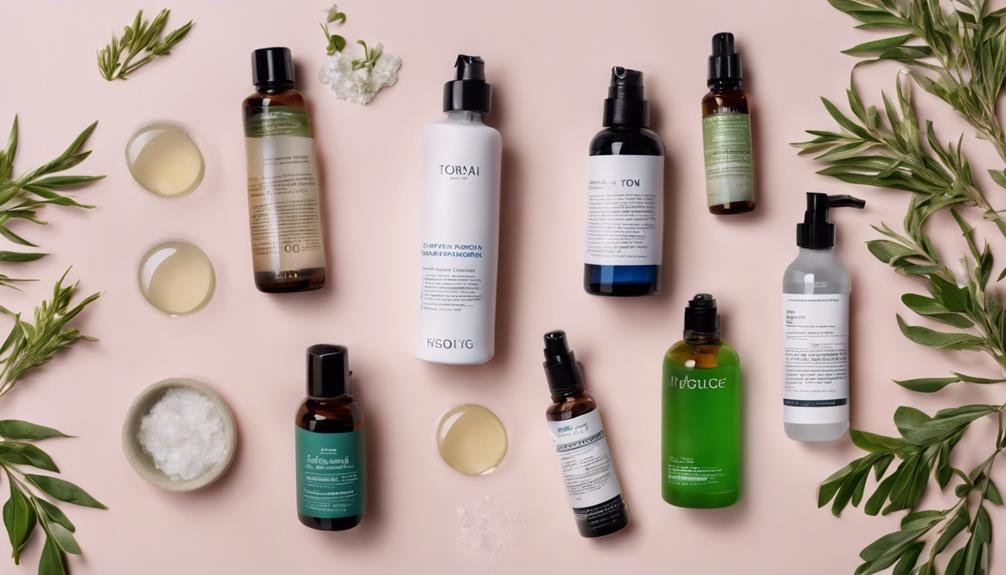
Enhancing your skincare routine involves carefully selecting a suitable toner that can provide additional benefits to your skin. Toners are designed to balance the skin's pH levels, remove any remaining impurities after cleansing, and prepare the skin to better absorb subsequent products like serums and moisturizers.
When choosing a toner, consider your skin type and specific concerns. Here is a table outlining different types of toners based on skin needs:
| Skin Type/Concern | Recommended Toner Type | Key Benefits |
|---|---|---|
| Dry Skin | Hydrating Toner | Restores moisture and plumpness |
| Oily/Acne-Prone | Clarifying Toner | Controls excess oil and fights acne |
| Sensitive Skin | Alcohol-Free Toner | Soothes and calms irritation |
| Aging Skin | Anti-Aging Toner | Helps reduce fine lines and wrinkles |
| Combination Skin | Balancing Toner | Balances oil production in T-zone |
Integrate Serums and Treatments
To build an effective skincare routine, incorporating serums and treatments is key to addressing specific skin concerns and achieving optimal skin health. Serums are concentrated formulas packed with active ingredients that penetrate deeply into the skin, targeting issues such as fine lines, dark spots, and hydration. When choosing serums, look for ingredients like hyaluronic acid for hydration, vitamin C for brightening, and retinol for anti-aging benefits.
Treatments, on the other hand, are products that address specific skin concerns such as acne, hyperpigmentation, or dullness. These potent formulations work to improve skin texture and tone over time.
- Choose serums based on your skin concerns: Hyaluronic acid for hydration, vitamin C for brightening, or retinol for anti-aging.
- Incorporate targeted treatments: Address specific issues like acne, hyperpigmentation, or dullness with specialized treatments.
- Follow the instructions: Use serums and treatments as directed to maximize their effectiveness and avoid potential irritation.
Find the Perfect Moisturizer
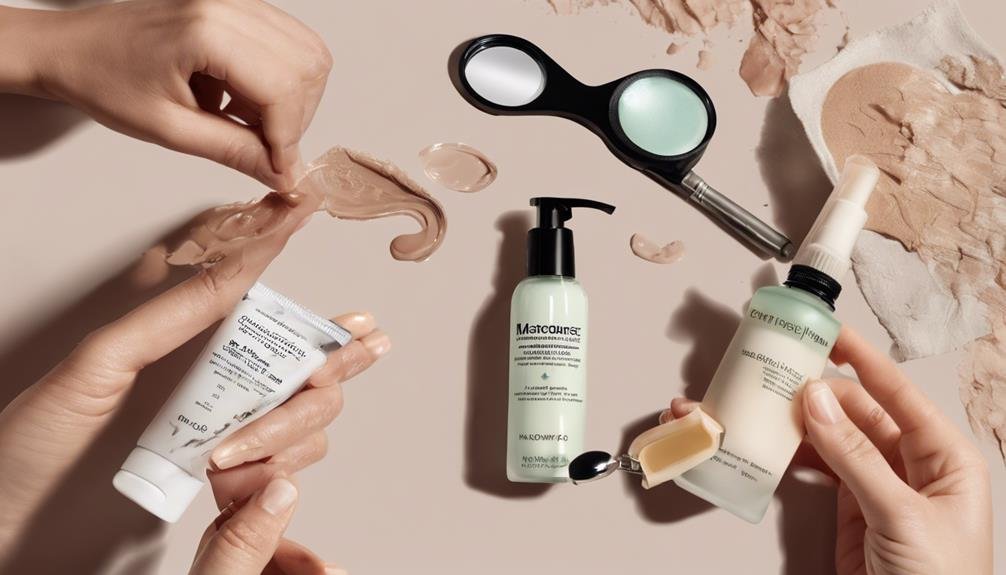
For achieving well-nourished and balanced skin, selecting the ideal moisturizer tailored to your skin type and concerns plays a crucial role in your skincare routine. Moisturizers help lock in hydration, strengthen the skin barrier, and provide essential nutrients for a healthy complexion.
If you have dry skin, opt for a rich cream with ingredients like hyaluronic acid and ceramides to deeply hydrate and repair your skin. For oily or acne-prone skin, look for oil-free, non-comedogenic formulas that won't clog your pores. Combination skin benefits from lightweight lotions that balance hydration without feeling heavy. Sensitive skin types should choose fragrance-free and hypoallergenic moisturizers to prevent irritation.
Remember to consider any specific skin concerns you might have, such as anti-aging or brightening, when selecting a moisturizer. By incorporating the right moisturizer into your routine, you can maintain a healthy skin barrier, improve texture, and achieve a radiant complexion.
Don't Forget Sunscreen
Selecting the ideal moisturizer for your skin is just the first step in building a comprehensive skincare routine. When it comes to skincare, one crucial step that should never be overlooked is applying sunscreen daily. Sunscreen not only helps prevent premature aging but also protects your skin from harmful UV rays that can lead to skin cancer.
Here are some essential tips to keep in mind when incorporating sunscreen into your skincare routine:
- Choose a Broad-Spectrum Sunscreen: Opt for a sunscreen that offers broad-spectrum protection to shield your skin from both UVA and UVB rays.
- Apply Sunscreen Generously: Ensure you apply a sufficient amount of sunscreen to all exposed areas of your skin, including your face, neck, and hands.
- Reapply Throughout the Day: Remember to reapply sunscreen every two hours, especially if you're spending extended periods outdoors or engaging in activities that may cause sweating or rubbing the product off.
Explore Eye Cream Options
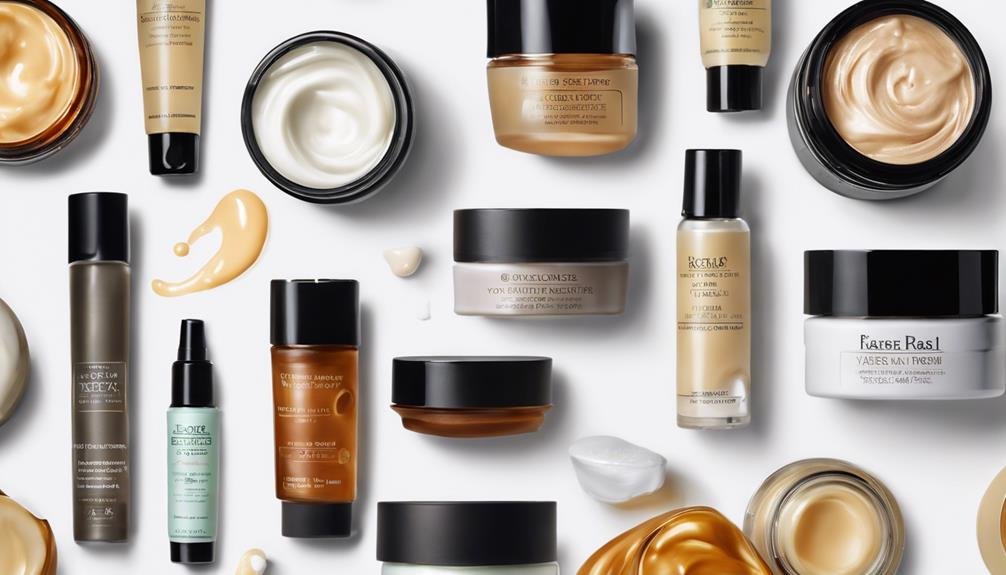
When considering your skincare routine, exploring eye cream options can be a beneficial addition to address specific concerns around the delicate skin surrounding your eyes. The skin around the eyes is thinner and more prone to dryness and wrinkles, making it essential to provide targeted care.
Look for eye creams with ingredients like hyaluronic acid, vitamin C, retinol, and peptides to hydrate, brighten, and minimize fine lines. These ingredients can help improve the appearance of dark circles, puffiness, and crow's feet.
When choosing an eye cream, consider your specific concerns, whether it's hydration, firmness, or dark circles. It's important to gently apply the eye cream using your ring finger to avoid tugging on the delicate skin.
Incorporating an eye cream into your skincare routine, both morning and night, can help protect and nourish this sensitive area, promoting a more youthful and radiant appearance. Remember, consistency is key when using eye creams to see the best results.
Embrace Face Masks
To truly elevate your skincare routine and pamper your skin, consider incorporating face masks as a luxurious treatment that can address various skin concerns effectively. Face masks provide a concentrated dose of beneficial ingredients that can deeply nourish, hydrate, and revitalize your skin. Here are three reasons why embracing face masks can be a game-changer for your skincare routine:
- Targeted Treatment: Face masks come in various formulations such as hydrating, brightening, and clarifying, allowing you to target specific skin concerns effectively.
- Deep Cleansing: Some face masks contain ingredients like clay or charcoal that can draw out impurities, unclog pores, and leave your skin feeling refreshed and detoxified.
- Relaxation and Self-Care: Applying a face mask can be a calming and therapeutic experience, providing you with a moment of relaxation and self-care in your busy routine.
Incorporating face masks into your skincare regimen can enhance the overall health and appearance of your skin, making it a beneficial addition to your beauty routine.
Add Face Oils for Extra Nourishment
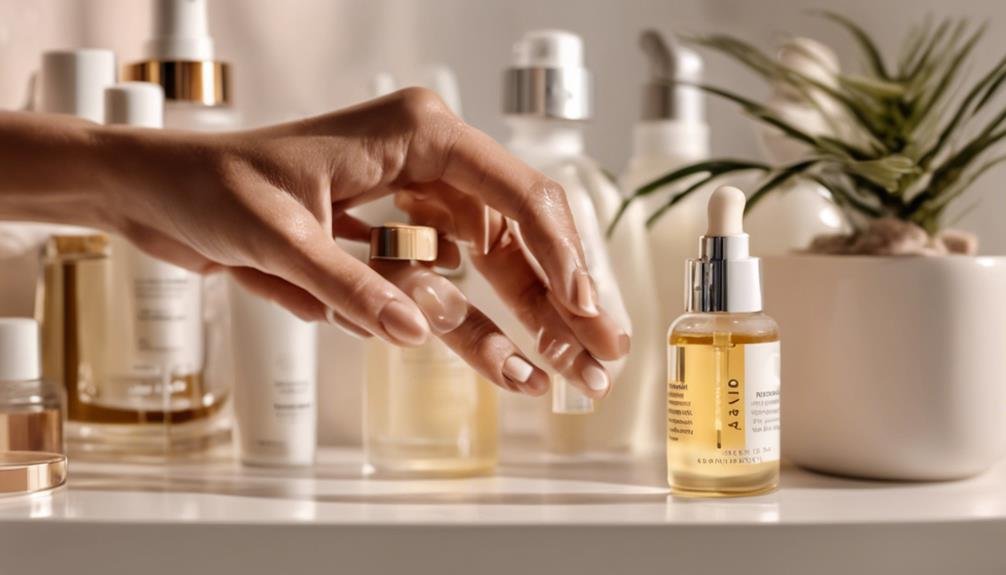
Consider adding face oils to your skincare routine for an extra boost of nourishment and hydration. Face oils are rich in essential fatty acids and antioxidants, which can help replenish and protect your skin barrier. They work by sealing in moisture and preventing water loss, making them especially beneficial for dry or dehydrated skin types.
When choosing a face oil, look for non-comedogenic options that won't clog your pores. Some popular choices include jojoba oil for its similarity to the skin's natural oils, rosehip oil for its brightening properties, and argan oil for its nourishing benefits.
You can apply a few drops of face oil after your serums or moisturizer to lock in moisture and enhance absorption.
Face oils can also be used to target specific skin concerns like fine lines, uneven texture, or dullness. Incorporating a face oil into your routine can leave your skin looking radiant, supple, and more youthful. Remember to patch test new oils and consult with a dermatologist if you have sensitive skin or specific skin conditions.
Establish a Consistent Routine
Establishing a consistent skincare routine is crucial for maintaining healthy and radiant skin. Consistency allows your skin to adapt to the products you use, ensuring optimal results.
Here are three essential tips to help you establish a successful routine:
- Morning and Evening Rituals: Start and end your day with a skincare routine to cleanse, moisturize, and protect your skin from environmental stressors.
- Stick to the Basics: Focus on a simple routine with key products like a gentle cleanser, moisturizer, sunscreen, and targeted treatments for specific concerns.
- Listen to Your Skin: Pay attention to how your skin reacts to different products and adjust your routine accordingly. If a product causes irritation, discontinue use and seek alternatives.
Frequently Asked Questions
Can I Use the Same Skincare Routine All Year Round?
Yes, you can use the same skincare routine all year round. Consistency is key for healthy skin. However, consider adjusting products based on seasonal changes or specific skin concerns to optimize results.
How Long Should I Wait Between Applying Each Skincare Product?
When applying skincare products, strive to wait 30 seconds to 1 minute between each one. This allows for optimal absorption and effectiveness. Remember, patience is a virtue in skincare – rushing through can compromise your results.
Is It Necessary to Use a Separate Neck Cream?
Yes, using a separate neck cream can be beneficial. The skin on your neck is delicate and can show signs of aging. Neck creams are formulated to target specific concerns like sagging or wrinkles, providing extra care for this area.
Can I Mix Different Brands of Skincare Products?
Yes, you can mix different brands of skincare products, but be cautious of potential reactions. Patch test new combinations. Avoid combining active ingredients like retinol or vitamin C without research. Enjoy experimenting with your skincare routine!
Should I Adjust My Routine if I Wear Makeup Daily?
If you wear makeup daily, adjust your skincare routine to include thorough cleansing, gentle exfoliation, and hydration. Properly removing makeup before bed prevents clogged pores and breakouts. Consider incorporating products that cater to makeup wearers for optimal skin health.
Conclusion
In the journey of skincare, think of your routine as a garden. Just like you tend to your plants with care and attention, nurture your skin with the right products and consistency. By understanding your skin type and concerns, choosing the right products, and establishing a routine, you can cultivate a healthy, radiant complexion that blooms with beauty. Remember, just like a garden, patience and dedication will yield the most fruitful results.

